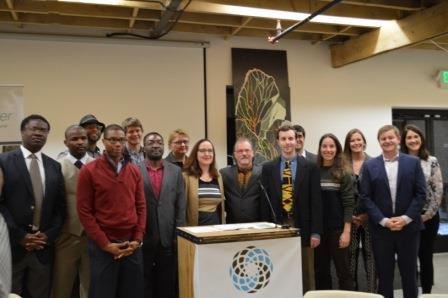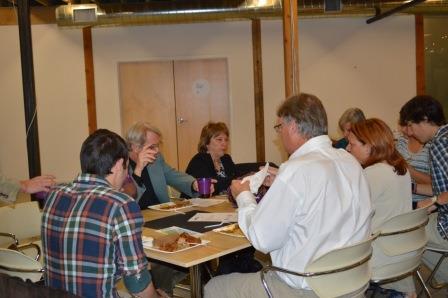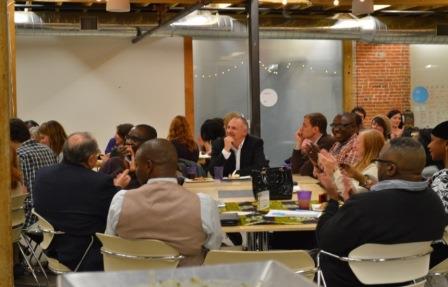TOWARDS A STRONG US-AFRICA ENGAGEMENT
Final Summit Report-2014
Towards A Strong US-Africa Engagement: Bringing the U.S.-Africa Summit to Colorado
On November 20, 2014, Africa Agenda and World Denver Young Professionals organized a dinner dialogue: Towards a Strong U.S.-Africa Engagement: Bringing the U.S.-Africa Summit to Colorado.
The event brought together about 100 Africa-oriented professionals and activists to consider how we can strengthen cooperation and collaboration between Americans and people across the African continent.
Africa Agenda and World Denver Young Professionals would like to thank the speakers, table captains, organizing committee, and volunteers that contributed their time and enthusiasm to the success of the event. Their names are listed at the end of this report.

The board members of Africa Agenda and World Denver Young Professionals pose for a photo with special guests, speakers. Denver, November 20, 2014
One of the major outcomes of the event was the strengthening of links and knowledge among the loose community of Africans, social and private organizations, and individuals in Colorado. As a result, many of the participants called for the need to continue this dialogue on a regular basis. From talking about the opening of the Afrikmall, which will be bringing African products to the community, to the over 20 organizations that described a wide variety of engagement with countries across Africa, the event showed that Colorado boasts a vibrant and growing Africa-oriented community.
The event was a direct response to the U.S.-Africa Leaders Summit, organized by the Obama administration in August of the same year. That Summit brought together more than 50 Heads of State and Governments from the African continent to Washington D.C., to meet with members of the administration, members of Congress, political and business leaders, and the African Diaspora to further relations with Africa.
Held at the Posner Center, the Colorado event offered an opportunity to build on the outcomes from Washington, hear from key speakers, and personally engage with the key topics of interest in our community. With few opportunities to meet in a single forum, the event helped build new connections and knowledge about Africa.
The master of ceremonies, A. Scott DuPree, opened the event, over catered Ethiopian cuisine from Konjo Ethiopian Restaurant, with remarks from Africa Agenda founder George A. Bamu and World Denver Young Professional’s Board Member Andy Astuno. Opening speakers were: Dr. Luka Powanga (Organizer of the annual Africa Energy Conference), Abdul Sesay (Denver Office of Economic Development and International Trade, representing Mayor Michael Hancock), Denver Councilman Albus Brooks, Denver Nairobi Sister Cities Committee chairman, Joseph Odhiambo, Posner Center for International Development Executive Director, Doug Vilsack, Internet Society Policy Advisor, Karen Mulberry and Corbina Lartson, CEO of Afrikmall. See the video highlight of selected speaker remarks.
Participants at 10 tables then began intensive table discussions facilitated by professionals with significant experience in the key questions on the role of women and girls, enhancing economic cooperation, improving health, media information and technology, resilience and climate change, developing power and energy, and supporting civil society, mirroring similar topics from the Washington D.C. Summit.

This summary report highlights three key insights from the tables drawn from the wide-ranging and rich discussions. These observations provide a glimpse of the interests and perspectives of the Colorado community. In this way, this report is a snapshot and only gives a sense of spontaneous energy, creativity, and learning that took place in November. We hope that it can, however, spark others to get engaged.
Please consider making a donation to support Africa Agenda! Thank you!
Table Topics and Insights
Women and Girls
How do we ensure that women’s voices are heard and that there is representation from women in future summits? Insights:
- Gender needs to be a transversal perspective included in all economic initiatives around development, infrastructure, security, peace, and education
- Different approaches can be successful, but continuing discrimination and marginalization needs to be addressed from both the top and bottom (i.e. grassroots) and with men included and contributing to the process
- Some key lessons from our work: agency and access = economic benefit; self-confidence emerge from education; information and resources need to be accessible to women and we need to encourage entrepreneurship.
Media, Information and Technology
Is net neutrality a concern for Africa? Yes. Global Internet policy project is an example. Insights:
- How do we best use technology for information? Examples:
- The international Ebola response
- Balancing high tech and traditional media.
- Using appropriate technology instead of the latest innovations, examples:
- Use solar-powered radios
- Web apps for local government
- Leapfrog traditional internet technologies in favor of social media and mobile phones
- Clean water and reliable electricity are still critical
- There is an information gap. What does it mean when Mogadishu has an undersea cable landing point but no functional government? Should Internet access be a human right? How to expand access
- Make the technology less expensive
- Promote digital literacy through web apps for children and content of interest to women and girls
- Strong government institutions based on the rule of law are also key to allow and facilitate access to information
- What is the role of NGOs in news making? How do we address local distrust of NGOs? Increase the quantity of local content and content providers. Reduce media stereotypes about Africa that alienate Africans from news coverage.
Health Cooperation
How can we improve US/Africa cooperation in global health and development – Ebola, HIV-AIDS, Malaria, and other health issues? Insights:
- Make sure that health priorities are centered on protecting the people. Towards this, the African Diaspora can play a significant role by disseminating information on prevention
- Encourage strong government policies to provide secure health systems with
- Appropriate infrastructure
- Health education
- Clean water
- Communications
- Promote appropriate investments, examples:
- Expand access to health by offering phone services over a cell phone
- Build emergency alert systems like an amber alert system to detect early outbreaks of disease
Civil Society Collaboration
How do we build effective collaboration through non-profits and grassroots organizations? Insights:
- Support grassroots organizations or non-governmental organizations. There is some disagreement here about how to identify organizations. Overall, support organizations directly if you know their work
- Organize at all levels; civil society represents people in a diversity of ways and we should act at the appropriate levels.
- Think in terms of movements or sustainability. Top-down programs produce products but are not dynamic social movements that continue to
- serve people’s wishes in the future.
Power Africa
What form do power and energy resources take in Africa – how to develop them responsibly? Table Insights:
- Focus on the readiness of countries to compete in energy development:
- Is there a well-trained and competent workforce?
- Countries must have business-friendly policies and regulations. Bureaucracy is a significant issue
- Technology will allow Africa to bypass traditional development methods.
- We need to develop relationships with a significant understanding of cultural differences—Africa is not a homogenous place—and work towards strong partnerships. Best businesses solve problems. Ideas allow access to capital: OPD, ADB, World Bank, IFC, IDC, Millennium Challenge, etc.
- There is some competition between the East and the West in African investment. The West is hindered by the history of “taking advantage.” China is not hindered by this history.

Climate Change and other issues of resilience
“Resilience?” What is the definition with respect to climate change? Insights:
- Climate change threatens all aspects of community activity but communities can work towards a resilience that will enable them to withstand these changes.
- Resilience is a cultural and context-relevant community capacity to achieve adequate self-sufficiency and improve response to insecurity and disasters. For example, a Ghanaian organization worked to stop the privatization of seeds to ensure local seed variety and its community’s ability to adapt to new climate patterns
- Community empowerment can improve livelihood systems. The engagement of neighborhoods and community centers in local production and services reduces the demand for outside assistance
- A resilient community does not stress its environmental resources beyond their capacity to regenerate
- For example, resilient communities suffer less from deforestation, overgrazing, overproduction of animals for meat or from human/wildlife conflicts. They can engage youth to assist in monitoring unlawful activities related to the use of their resources.
Thank You!
We offer special thanks to the following organizations and volunteers who contributed an enormous amount of their time and generosity to make the event possible: World Denver Young Professionals, Africa Agenda, African Leadership Group.
